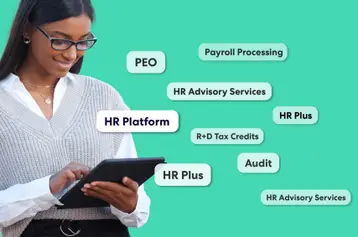PEO Employment Law Compliance: Work with an HR Expert

Table of contents
- 1.The Growth of Employment Laws
- 2.How PEOs Simplify Compliance with Employment Law
- 3.Recruiting Process
- 4.Interviewing, hiring and onboarding
- 5.Employee status and worker classification
- 6.Risk and workplace safety
- 7.Wages
- 8.Benefits
- 9.Time Off Requirements
- 10.Discrimination and harassment
- 11.Termination
- 12.TriNet's Client Relationship with Edge Electronics
- 13.PEO Employment Law Compliance: TriNet
To keep their companies operating successfully, small business owners are responsible for complying with a host of local, state, federal and industry requirements. Employment law is a treacherous landscape to navigate, and the consequences for failure can be high.
In 2023, the Equal Opportunity Employment Commission resolved 83,787 charges of workplace discrimination, resulting in $346.2 million in fines and settlements. That figure doesn't even include the legal costs that businesses incurred.
If you have tight resources and team members with limited expertise or availability, how do you maintain compliance? One way is to work with a PEO, which can provide HR expert best practice guidance to small and medium-sized businesses. In this article, we'll look at how PEO HR expertise can help your business stay abreast of ever-changing employment-related rules and requirements, while you focus on core operations.
The Growth of Employment Laws
Compliance obligations for employers seem to be on a path of constant growth. At the same time, employees are becoming more aware of their rights and more willing to take action.
Recent trends in employment law have centered on boosting worker protections, particularly in areas like wages, overtime and benefit mandates.
Many states and localities have raised minimum wage requirements, with most surpassing the federal threshold of $7.25 per hour. This creates a patchwork of wage standards across the country. Over 98 states and localities have minimum wage laws that exceed $7.25, and some laws are crafted to raise the minimum wage gradually each year until it reaches a target amount.
Meanwhile, there has been a push for greater pay transparency, with laws requiring businesses to disclose compensation ranges in job postings to address pay inequality.
Paid leave has become another central issue. Several states have paid family and medical leave programs, while others have strengthened paid sick leave laws. Illinois added “family responsibilities” to the list of protected classes under the Illinois Human Rights Act. This makes it unlawful to discriminate against employees with, or perceived to have, family caregiving responsibilities.
The gig economy has also driven significant changes. California passed a law, Assembly Bill 5 (AB 5), to reclassify certain independent contractors as employees, thereby extending more benefits and protections.
Businesses that fail to comply with these evolving employment laws can face fines and lawsuit judgments, as well as fees. Non-compliance can also result in low employee morale, disengagement and higher turnover rates. Businesses that don't stay ahead of changing employment laws may face both financial and reputation damage. This underscores the importance of maintaining up-to-date compliance practices. Enter the PEO.
How PEOs Simplify Compliance with Employment Law
A professional employer organization (PEO) is a third-party HR provider that offers services to help businesses administer certain human resources functions such as payroll processing, benefits administration, compliance and risk mitigation. In a co-employment relationship with the PEO, the PEO assumes certain responsibilities outlined in the client service agreement.
A PEO that services hundreds of businesses in many different states must be adept at tracking, understanding and adapting to new or updated regulations. Let's look at some key areas in which PEOs can assist with compliance.
Recruiting Process
A PEO simplifies HR compliance during the recruiting process by providing the tools to help the client with hiring. This may include providing clients with best practices on federal, state and local regulations, such as:
- The Fair Labor Standards Act (FLSA)
- Equal Employment Opportunity (EEO) laws
- I-9 verification for employee eligibility
The PEO also supports compliance by providing best practice guidance on state-specific requirements, job classifications, confidentiality agreements and other HR tasks, and streamlines the background checks process with access to a vendor. This support allows the business to focus on other priorities, such as selecting the best candidates.
Interviewing, hiring and onboarding
The interviewing process is a key area of HR compliance that requires careful attention, particularly as it relates to discrimination. Businesses should keep interview questions consistent for all candidates, focusing solely on relevant work experience and skills.
Various laws, including those born from the "Ban the Box" movement, prohibit asking applicants about criminal backgrounds or conducting criminal background checks during early stages of the hiring process. Wage history bans limit what can be discussed in interviews. Compensation disclosure requirements in the recruiting process are also increasingly common. A PEO can help a business navigate the ins and outs of the hiring process, especially since it can be tricky to navigate objectively and fairly.
For businesses navigating these complexities, resources like TriNet’s eGuides on hiring and multi-jurisdictional considerations can provide helpful best practice guidance.
Employee status and worker classification
Worker misclassification is a common compliance misstep, especially when it comes to "employees" vs. "independent contractors." It can lead to penalties, payment of back taxes and other fines. Fortunately, a PEO, with its deep knowledge of federal and state employment laws, including IRS and Department of Labor rules and requirements, can help businesses navigate this.
Risk and workplace safety
A PEO can help simplify compliance related to workplace safety and risk mitigation by helping businesses navigate Occupational Safety and Health Administration (OSHA) standards and other industry-specific safety regulations. The PEO can provide expert best practices on:
- Developing and implementing comprehensive safety programs
- Conducting workplace risk assessments
- Maintaining required safety records
- Staying up-to-date with safety training and regulatory changes
PEOs can also provide access to workers' compensation programs and assist in managing claims. In the event of an accident, the PEO can help the company with the claims process. The PEO can also mitigate risk by providing guidance to help reduce the likelihood of workplace injuries and access to training on how to better safeguard both your employees and your workplace.
Beyond providing guidance on mitigating occupational risks, a PEO can also help provide best practices on digital safety. In the modern workplace, data protection is one of the biggest concerns.
One recent study revealed that nearly 43% of businesses did not pass a compliance audit in the past year. Among those businesses, 31% suffered security breaches during the audit processes, compared with 3% among compliant businesses. By engaging with a PEO, businesses can learn about security threats and trends, which can help them implement internal data protection measures.
Wages
It's not easy to adhere to wage and hour laws, especially with frequent changes at the local, state and national levels. A PEO helps businesses navigate compliance with minimum wage laws and overtime requirements and mitigate risk of costly wage disputes, back pay claims, or penalties from miscalculations or improper wage practices.
A PEO can also help with pay rates, bonuses and deductions, and they regularly update employers on changes to wage-related requirements.
Beyond payroll processing, a PEO platform security can also help maintain records of important employment-related documents. By automating payroll processing functions, the PEO can also help businesses with less vulnerability from manual errors.
Benefits
A PEO simplifies compliance for PEO-sponsored benefits by providing access to health insurance and retirement plans that comply with federal and state regulations.
The most common laws of interest in this category include Affordable Care Act (ACA), which mandates specific healthcare coverage requirements for employers, and the Employee Retirement Income Security Act (ERISA), which governs retirement and pension plans. By leveraging its expertise, the PEO can administer benefit programs to meet regulatory standards. This helps businesses avoid costly fines, legal challenges and administrative errors.
In addition to regulatory compliance, a PEO may provide access to more competitive benefit packages and coverage options than a small business could typically access on its own. The PEO manages employee communications, open enrollment and ongoing compliance with employee benefits laws.
Time Off Requirements
Paid sick and safe leave, as well as family and medical leave, are important employee benefits, but the rules for them vary widely across states, localities and industries. Requirements such as accrual rates or hours may depend on company size or location, making it crucial for employers to understand the policies in every area where they operate.
With the complexity of state paid family leave acts and company-specific policies, employers must navigate overlapping benefits for compliance and provide strong support for employees. Mismanagement of leave administration can lead to workforce dissatisfaction and compliance risks.
Discrimination and harassment
A PEO can simplify compliance related to discrimination and harassment by providing best practices guidance so businesses can implement and enforce robust anti-discrimination and anti-harassment policies that align with federal, state and local laws.
The PEO provides best practice guidance on creating inclusive workplace environments so companies are up-to-date with laws such as:
- Title VII of the Civil Rights Act
- The Equal Pay Act
- The Americans with Disabilities Act (ADA)
PEOs may provide training resource to both employees and managers on discrimination and harassment.
Even the best workplace has some interpersonal issues, and dispute resolution can be time-consuming and tricky without an HR expert. A PEO may offer support in addressing sensitive matters like complaints or claims of harassment.
A PEO’s HR expertise can also help businesses so they can establish proper procedures, from documentation to resolution, and navigate compliance with location specific requirements.
Termination
If you're an employer, this is probably one of the toughest parts of your job. It can be helpful to have a provider who can provide support with the more technical aspects, so it is not overlooked.
PEOs are familiar with federal, state and local employment-related rules and requirements. With their expertise and support, you can navigate the documentation and final paychecks process with applicable the rules and requirements. This helps mitigate the risk of potential issues by keeping procedures consistent throughout the termination process.
PEOs can also administer paperwork like COBRA notifications, for clients who are on the PEO-sponsored plan, and support unemployment insurance claims.
A PEO’s support not only helps the employer mitigate risks but also lessens the administrative burden on HR teams. This comprehensive approach to navigating compliance obligations can provide peace of mind to businesses.
TriNet's Client Relationship with Edge Electronics
Prior to working with TriNet, Edge Electronics administered HR functions like many small businesses—in-house with ad hoc external consultations—a method which proved difficult. To help optimize operational and HR costs, and access health care benefits they can offer to their team of over 30 employees in 10 states, CEO Adrienne Giannone quickly recognized the value in outsourcing services to TriNet.
As Edge's team continues to grow, TriNet supports compliance for payroll and benefits administration. “They know all the [employment] laws and rules for every state and that gives me a reason to be able to sleep better at night,” said Giannone. “It’s very difficult to know what each state requires, so the compliance issue is huge.”
PEO Employment Law Compliance: TriNet
SMBs have a lot to keep track of. Laws, regulations, paperwork — all can bog down your processes when you're trying to run a lean and thriving operation.
If you need help supporting the ins and outs of employment law, contact TriNet, an expert for HR and compliance support.
Get your HR compliance checklist today — https://www.trinet.com/insights/your-hr-compliance-checklist.

TriNet Team
Table of contents
- 1.The Growth of Employment Laws
- 2.How PEOs Simplify Compliance with Employment Law
- 3.Recruiting Process
- 4.Interviewing, hiring and onboarding
- 5.Employee status and worker classification
- 6.Risk and workplace safety
- 7.Wages
- 8.Benefits
- 9.Time Off Requirements
- 10.Discrimination and harassment
- 11.Termination
- 12.TriNet's Client Relationship with Edge Electronics
- 13.PEO Employment Law Compliance: TriNet






